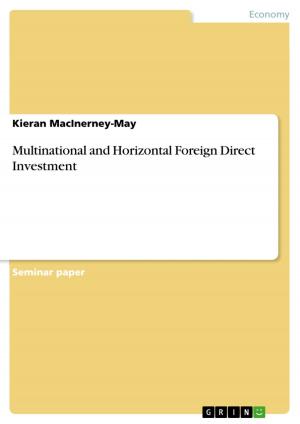Foreign direct investments in Poland since 1989 - Theoretical background, specific advantages and recent developments
Theoretical background, specific advantages and recent developments
Business & Finance, Economics, Urban & Regional| Author: | Michael A. Braun | ISBN: | 9783638621915 |
| Publisher: | GRIN Publishing | Publication: | February 28, 2007 |
| Imprint: | GRIN Publishing | Language: | English |
| Author: | Michael A. Braun |
| ISBN: | 9783638621915 |
| Publisher: | GRIN Publishing |
| Publication: | February 28, 2007 |
| Imprint: | GRIN Publishing |
| Language: | English |
Seminar paper from the year 2003 in the subject Economics - Case Scenarios, grade: 1,00, University of Abertay Dundee (Economics Department), course: Mini-Project on Europe, 17 entries in the bibliography, language: English, abstract: The collapse of communism has started a dramatic change in the economies and societies of eastern and central Europe (ECE). The transformation from a planned to a market-economic system has lead to the opening of previously closed markets. Since 1989 this region is not only a new market to sell to, but also a place to produce. And especially western-European enterprises might benefit from this due to short distances, which help to integrate these locations into a worldwide firm-strategy. European companies now have got the same possibilities like the US or even Japan to produce cheaper directly at their doorstep. However, the integration of ECE does not simply mean the extension of western markets to an eastern location. There is much more such as the complete restructuring of western production chains. Or in other words, there is a dual process of transformation (east) and structural change (west). This report focuses on Poland and its foreign direct investment (FDI) inflows since 1989. In order to evaluate the importance of FDI for Poland, three guideline questions are asked: (1) Why do companies invest in general in foreign areas? (2) Why received this specific country capital from international investors? And (3) finally, to what extent and in which sectors have foreign investors invested? Therefore, a core model in economics was used to solve these questions: the concept of ownership-, location- and internalisation-specific advantages. One does not know what future might bring. But for sure Poland has tried to find its position within a new world order. After centuries of dependence, this county now seems to be willing to search for a bright future. Therefore FDI are seen to help to stabilize and to develop that country. And even the short period of time since 1989 might underline this, too.
Seminar paper from the year 2003 in the subject Economics - Case Scenarios, grade: 1,00, University of Abertay Dundee (Economics Department), course: Mini-Project on Europe, 17 entries in the bibliography, language: English, abstract: The collapse of communism has started a dramatic change in the economies and societies of eastern and central Europe (ECE). The transformation from a planned to a market-economic system has lead to the opening of previously closed markets. Since 1989 this region is not only a new market to sell to, but also a place to produce. And especially western-European enterprises might benefit from this due to short distances, which help to integrate these locations into a worldwide firm-strategy. European companies now have got the same possibilities like the US or even Japan to produce cheaper directly at their doorstep. However, the integration of ECE does not simply mean the extension of western markets to an eastern location. There is much more such as the complete restructuring of western production chains. Or in other words, there is a dual process of transformation (east) and structural change (west). This report focuses on Poland and its foreign direct investment (FDI) inflows since 1989. In order to evaluate the importance of FDI for Poland, three guideline questions are asked: (1) Why do companies invest in general in foreign areas? (2) Why received this specific country capital from international investors? And (3) finally, to what extent and in which sectors have foreign investors invested? Therefore, a core model in economics was used to solve these questions: the concept of ownership-, location- and internalisation-specific advantages. One does not know what future might bring. But for sure Poland has tried to find its position within a new world order. After centuries of dependence, this county now seems to be willing to search for a bright future. Therefore FDI are seen to help to stabilize and to develop that country. And even the short period of time since 1989 might underline this, too.















